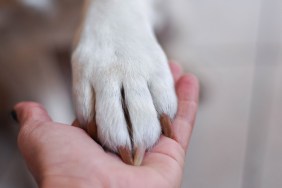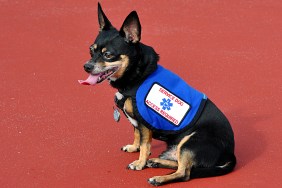In New York, hockey players and incarcerated prisoners now have something in common — Rick, a nine-month-old Newfoundland puppy.
When he isn’t cheering on the Buffalo Sabres hockey team as their official team pet, he’s training with local prisoners to be a service dog.
After a long morning of taking 198 #Veterans to breakfast, which was totally awesome by the way, we had to rush to the @KeyBankCtr with “Rick” to get some time in with the @BuffaloSabres . @NiagaraSPCA @NiagaraSheriff pic.twitter.com/nitu058RsC
— WNYHeroes (@WNYHeroes) November 26, 2021
It’s all part of a program called Pawsitive for Heroes from WNY Heroes. Since 2007, the organization has been steadily placings dogs with veterans to assist in recovery from various forms of military trauma.
But Why Incarcerated Prisoners?
When you meet Rick, you will definitely be asked for belly rubs pic.twitter.com/dgrP7xrzte
— Buffalo Sabres (@BuffaloSabres) November 30, 2021
President and Co-Founder of WNY Heroes, Chris Kreiger, tells WGRZ that the “demand is huge” for service dogs. In fact, they can’t train dogs fast enough to meet it.
This is where incarcerated prisoners step in to help, with plenty of time to do so.
With the guidance of the program’s official trainer, John Knoph, prisoners learn how to be dog “handlers,” which is similar to being an assistant. They learn the training, then apply and reinforce it with their dogs in the prison.
Once a pup is fully trained, they’re placed with a veteran.
Why The Program Is So Important
When Rick completes his training, he will be assigned to a veteran in need of a service dog.
We are proud to partner with @wnyheroes and their Pawsitive for Heroes program in support of veterans. pic.twitter.com/dKkP1o40ZX
— Buffalo Sabres (@BuffaloSabres) November 11, 2021
Even before COVID-19, the need for service dogs was clear, but the pandemic has certainly exacerbated the issue. Prisoners stepping forward to expand training efforts helps veterans, and they get quite a lot out of it, as well.
Prisoner Henry Stovall told WGRZ that the pup he lives with and trains, in the prison, has “made a big difference” for him and has taught him “patience.” He further relayed how appreciative he is of the program and the opportunity it provides to “give back.”
Rick’s Training Is Well Underway
Meet Rick!
We are thrilled to announce our partnership with @WNYHeroes and their Pawsitive for Heroes program to make Rick a member of the Sabres family this season.
Learn more: https://t.co/SGa1EaYGEz pic.twitter.com/XGdYNE4lK7
— Buffalo Sabres (@BuffaloSabres) November 9, 2021
“He was a handful when he was (at the SPCA), but he is definitely doing great,” said Tina Kennedy, a canine behavioral specialist with the Niagra SPCA. “His training is going wonderful, and I think he’s got some great potential.”
With the continued success of pups like Rick, Kreiger and the local sheriff hope to expand the program to other correctional facilities.
For all involved, it seems to be a truly humane initiative. If you’d like to donate to the program, you can do so here.
What do you think of dogs like Rick training with prisoners? Do you think this program helps all involved? Let us know in the comments below.









